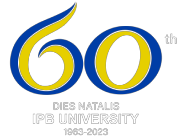Strategic Program
Strategic program in the field of education
- Implementation of education program (EP) with intact shapes of higher education which comprise vocational EP, academic EP, and professional EPthrough attern and manner of integrated implementation.
- Conducting research for improving the quality of teaching materials and forestry development which is integrated with program of acceleration of university teaching staff’s career on quality basis.
- Strengthening the network of research cooperation (collaborative research) at national, regional, and global level, with prominent universities or research institutions, for the sake of scientific, knowledge, and technological development inthe field of forestry and environment.
Strategic program in the field of research
- Conducting mapping of research demand and determining the appropriate and best topic of research in conformity with demand from development of forestry and environment.
- Conducting research for improving the quality of research materials and forestry development which is integrated with teaching staff’s career acceleration program on quality basis.
- Strengthening research cooperation network (collaborative research), at national, regional, and global level, with some prominent universities or research institutions for the sake of development of science, knowledge and technology in the field of forestry and environment.
Strategic program in the field of public service
- Conducting public service with clear segmentation of target groups (forest farmers, businessmen, profession organization, government, and international community) on the basis of research results in conformity with the scientific fields which become the assignment area for teaching staff’s academic position, either individually, or in groups;
- Conducting socialization, dissemination and creating feedbacks of research results and implementation of other programs of higher education for improvement of education quality and resolution of development problems;
- Strengthening cooperation network with stakeholders, as medium for contributing research results and responding toward forestry problems;
- Developing centers of information and integrated service of tropical forestry science and knowledge.
Strategic program for enhancement of management system of Forestry Faculty
- Preparing the formation of trust fund for Faculty of Forestry (IPB)
- Developing capacity of human resources, organization, regulation and working mechanism;
- Developing cooperation network (cross cutting) with other forestry faculties or universities at national, regional, or global level.
Strategic program in the field of education is aimed at improving the understanding, attitude, knowledge and skill of human resources by developing science and technology for management of Indonesian tropical forest.
Strategic program in the field of research is aimed at developing innovation of forestry science and knowledge for supporting education and public services. The research fields comprise the whole sciences of forestry and environment, which comprise among other thingsthe subjects of forest management, utilization and processing of forest products, silviculture, and conservation of forest resources and ecotourism.





 Dalam rangka mewujudkan Fakultas Kehutanan IPB menjadi Lembaga Tinggi Kehutanan International, Fakultas Kehutanan IPB bekerjasama dengan perguruan tinggi di luar negeri untuk melaksanakan pendidikan di Fakultas Kehutanan IPB.
Dalam rangka mewujudkan Fakultas Kehutanan IPB menjadi Lembaga Tinggi Kehutanan International, Fakultas Kehutanan IPB bekerjasama dengan perguruan tinggi di luar negeri untuk melaksanakan pendidikan di Fakultas Kehutanan IPB.